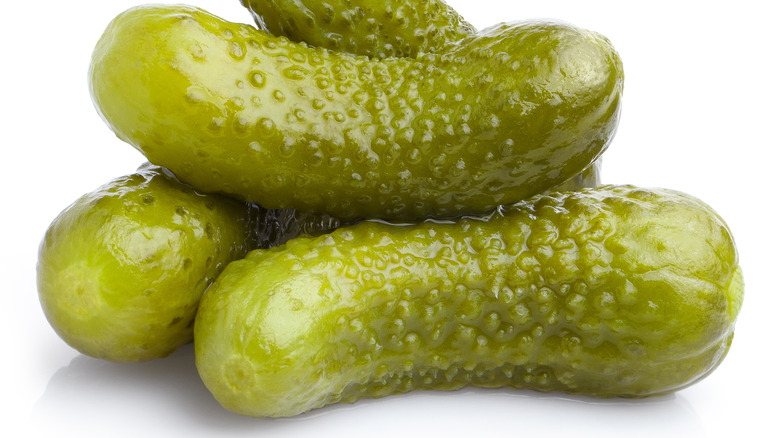PB loves pickles—sweet and dill, slices and spears, processed and refrigerated—so he is always on the lookout for a new pickle recipe. I found a good one for him.
The recipe comes from a guy named Nicander, a Greek poet, who jotted down his method for making pickles in 200 B.C.
“The vegetable should first be dipped in water and then baptized in vinegar.
The first step is temporary, the second produces a permanent change.”
Nicander used two different Greek words to differentiate between the two different steps.
“Bapto” = dip
“Baptizo” = immerse
“Bapto” a cucumber in water and what do you have?
A clean cucumber.
“Baptizo” a cucumber in vinegar and what do you have?
A transformed cucumber.
A pickle.
Thanks to a Greek poet who lived 200 years before Christ, we have a compelling picture of what being a Christian really means.
It’s not enough to dip our toes into belief, hanging onto our old identity, but cleaning up our act from time to time.
God wants us to soak in Him, be immersed in His love and mercy until, over time, it begins to produce a permanent change—transformation.
“For John baptized with water,
but in a few days you will be baptized with the Holy Spirit.”
Acts 1:5
John the Baptizer dipped people in the Jordan River for the forgiveness of their sins. Sooner or later, those people would have to come back, re-confess, and get re-dipped. The Holy Spirit works from the inside, “pickling” us, creating something new.
“If anyone is in Christ, he is a new creation;
the old has gone, the new has come.”
1 Cor. 5:17
A wise man once said:
“Once you’re a pickle,
you can’t go back to being a cucumber.”
I think there are more analogies hiding in here.
Let your thoughts steep a while and then share, please!



Well done, Dinah! I’m going to share this!
Thanks for reading and sharing!
Great thoughts! Some pickle aficionados feel quite strongly that the best pickles are fermented ones. No vinegar is necessary. They’re simply cucumbers (or cabbage or any variety of vegetables) and salt. Of course that’s salt that hasn’t lost its ‘savor’. The combination of cuke and salt and time creates a pickle that not only delights the taste buds but has super microflora that even transform the gut of the eater. That ‘baptizo’ with salt and cucumber creates a ‘baptizo’ all over again in the person who eats it.
That’s so interesting! Just salt and cucs? In jars? Any water? Blake is curious!
I’m so confused; I replied a few days ago but am not seeing my reply here so I’ll try again. Yes, for picling/fermenting cabbage it’s just cabbage and salt. To pickle cucumbers and other vegetables, water and salt are used. The salinity inhibits ‘bad’ bacteria while allowing the fermentation to happen. It used to be done in crocks (stoneware) but now days many folks do it in jars. I’ve made cabbage/sauerkraut but have not made fermented pickles.
Pingback: Pickling | a small drop of ink
I don’t know what happened to your last comment. 🤷♀️
Also, I’m finding out there is a whole lot I don’t know about fermentation. Very interesting stuff, but not appealing to my sweet palate. Blake, however, is savory and likes pickled everything. 😊